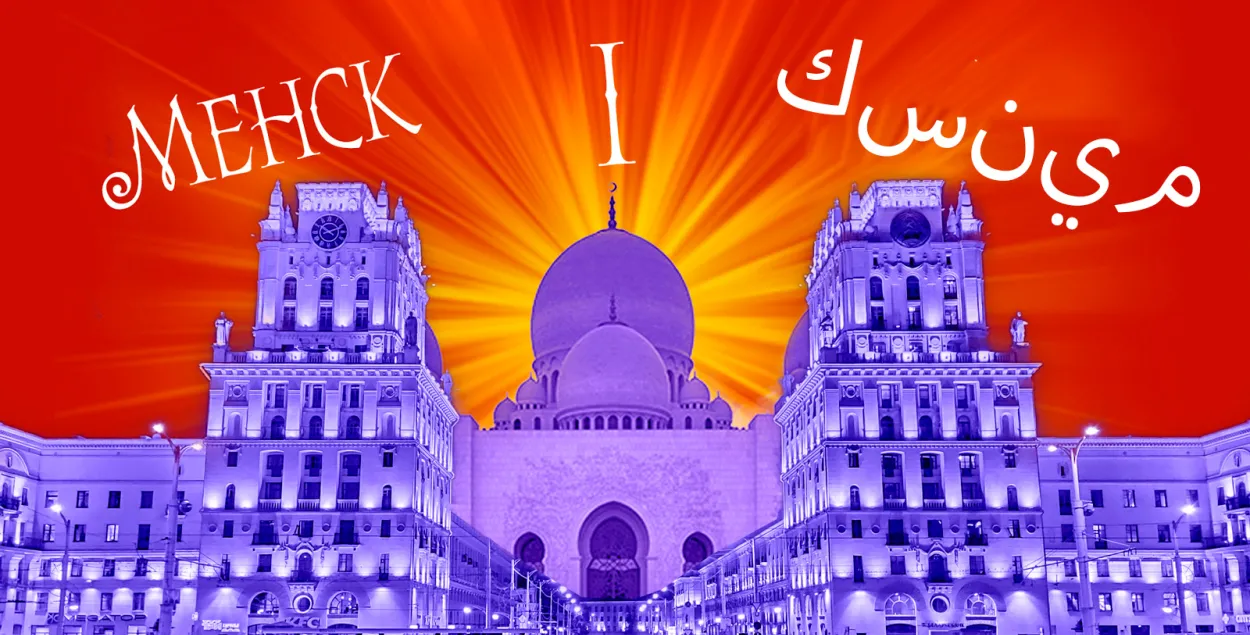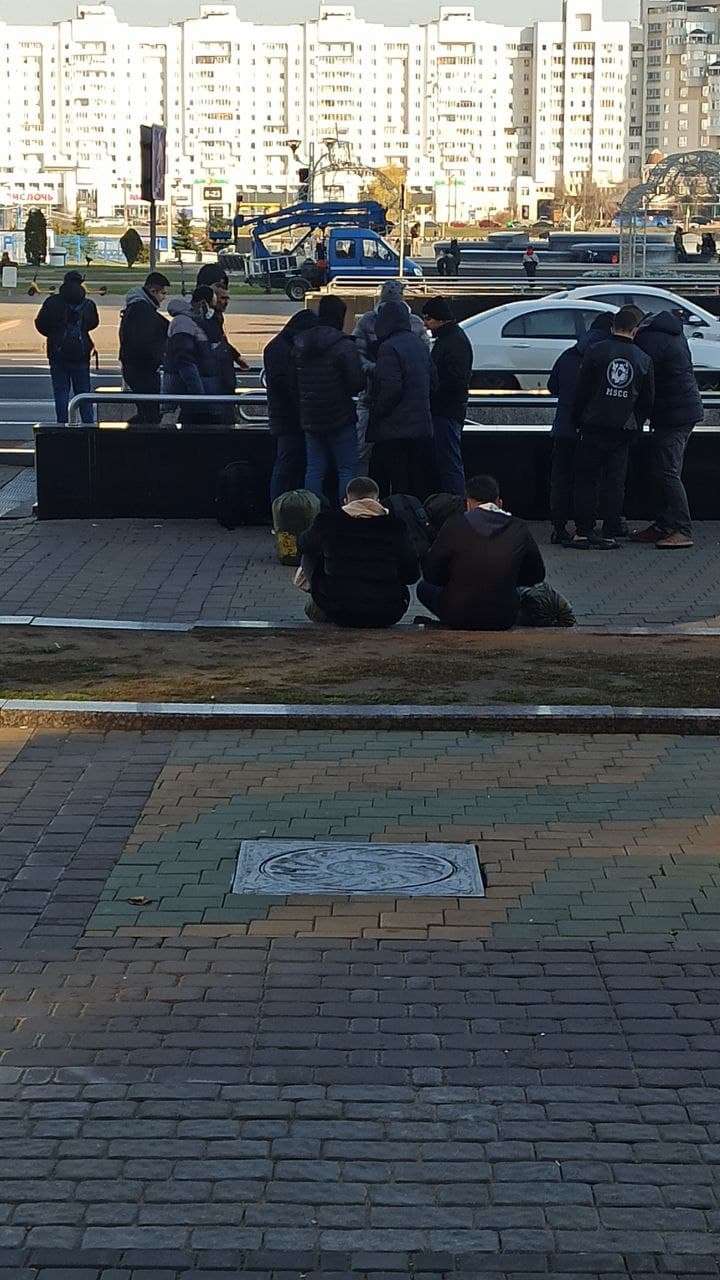Arabic Minsk. Can Belarusians remain tolerant?

Did the Belarusian large-mindedness survive the crisis? / collage by Vlad Rubanau, Euroradio
A few months ago, guests from the Middle East were arriving at the hotels via buses. Those were the well-off individuals who could afford to live like that.
Now, anyone can see people spending nights on the streets of Minsk, with the cold Belarusian November keeping them company. According to the migrant online communities, these could be the people with expired visas who cannot legally check in to a hotel and merely the poor folk.
It's "fewer families with kids now."
Whole families of tourists are shopping for sim cards in the mobile phone outlets scattered all over Nyamiha district. The employees refuse to comment, saying everything inside the outlets is recorded. They suggest we reach out to the call center to get relevant statistics on the newly registered foreign visitors.
Those who have already acquired a sim card wander around Minsk with the phones in their hands. They're video-chatting with their families.
People with identical Alaska bags travel between the hotels and the Galleria Minsk shopping mall. There are police cars near Galleria, and several patrols stroll around Victors avenue. A small camp is set near the Minsk Sports Palace. There are bags and backpacks piled on the benches near the fountain. Their owners are sitting nearby, divided into small groups.
The hotel employees who agreed to talk to us can barely add to the story. You can see everything yourself, they say. They call their guests the "tourists" and smile knowingly.
"Where once people would come in numbers, by buses or minivans, now they're checking-in in small groups of three. They've also been bringing notably fewer children for these past few weeks. Mind, before that, it was families with kids, often more than one kid," recounts an employee of a hotel located in Minsk.
At another hotel, they say it's practically impossible to start a conversation with the guests. Hardly anyone speaks English.
"They don't usually translate for each other since they're all from different countries," explain the employees and then continue to wonder. "How are they going to live in Europe? Why are they heading there? To get a financial allowance?"
What are these people running from? We asked the human rights activists.

"We have been mainly dealing with the Iraqi Kurds. I remember a very notable story about a man who was an Iraqi police officer and who left the country for fear of the terrorist attacks that targeted police stations, among all other locations.
Another person we talked to got hurt during the shooting, which also happened during the terrorist attack. Many different stories led to the same outcome: people were forced to pack up and seek refuge in Europe.
We realize not everyone might be telling the truth. But we have yet to meet a person who left the country because of economic reasons. Mostly, people are running because they fear for their lives."
There are not many guests at the hotel during the day. Most of the "tourists" go shopping at this time. The employees say there were about "150 people" in the hotel lobby in the morning.
"Come in this evening; you'll see for yourselves," we are told rather mysteriously at the hotel. "All of the taxi drivers are pumped; they know where to go."
However, it is not so different in the evening. A group of ten guests in the lobby, and that's it. The hotel itself and the surrounding grounds are quiet.
The tight space near the Galleria Minsk is much more crowded. Even though the hotels are full of foreigners, not everyone can afford to rent a room. At 10 p.m., there are dozens of people still sitting on their backpacks and carryalls beside the fountain close to the shopping mall.
"It used to be cashed-up, people, and now it's only the poor ones."
The staff of the Galleria's food court and shops are meticulous about what they say. Some talk about the tourists' preference for pilaf (the food court is extra busy where the Eastern cuisine is served), others state the obvious: yes, there are more foreigners than it used to be. They refuse to continue the conversation, though.

One of the overseas guests is holding a bag from Sportmaster. It would be safe to assume, and it's where the tourists would stock up with all the necessary stuff for the dangerous journey that lies ahead. Sportmaster's staff, though, tell us they didn't notice any unusual influx of customers.
The taxi drivers, on the contrary, did. One of them, Anatol (not his real name), started to see more foreign guests right in the middle of the summer, which is to be expected. There's been even more of them in the past two weeks. These are not the same tourists that arrived at the hotels by buses, though.
"Back then, it was cashed-up people; that much was obvious. Now it's only the poor ones, the disadvantaged people with low income. They used to go either to Brest or Grodno from Minsk. Now, it's just Grodno. They say it's easier to cross the border there, for some reason. We're turning into Paris or something. There's no sympathy in me anymore."
He also noticed that the people coming to Minsk were better prepared: his last clients were dressed for the weather. When Anatol guessed that they were from Iraq, someone immediately corrected him. Syria.
"These guys had some cash. They rented a flat. Each had three shopping bags in their hands. They had tents and were wearing light puffer boots. I recorded a translated sentence that I used to communicate with the Iraqis, and they told me they were Syrians, not Iraqi. In my experience, the Syrians are heading to Brest and the Iraqi – to Grodno."

"We started monitoring the situation and surveying the transit refugees currently on Belarusian soil. To do that more efficiently, we need people who can speak Arabic since the refugees mostly know neither English nor French.
People who are migrants not by choice but necessity need clothes and medication. Some of them end up homeless when they run out of money. We can already see that some people sleep on the streets, with the kids, no less.
Additionally, those who spent several days in the forestal border area require medical attention. Some of them are nearly frostbitten or have issues with their legs because of sitting still for long periods.
They also need legal support. Some are coming to Belarus without fully understanding what kind of rights and duties they have. What is the process of applying for asylum in Europe, and could they, perhaps, receive it in Belarus? We have to educate them, too.
More often than not, they contact us after a failed attempt at crossing the border. Sometimes, their families put in a request in the name of their close ones who didn't manage to cross over to Europe and are still under the escort of border guards.
Sometimes a foreigner is just a tourist
From time to time, the related online communities see photos of people sleeping on the streets posted. One of the users, Aziz, commented on such a post with a video shot from the window of the Yubileynaya Hotel.
Aziz comes from Iraq. We asked him what pushed him to go to Belarus. He said a friend of his went there to study and told him a lot about the country. So, in July, Aziz decided to escape the Iraqi heatwave and came to explore Minsk.
"It was a beautiful experience, a beautiful feel. People are kind here, compassionate. On my first day, I wanted to go to a restaurant. So, I asked a girl who was passing by to help me order a taxi. When my ride was over, I found out that she had paid for my trip without saying anything.
I would love to come here once again sometime. But the Iraqi Airways ceased flying to Belarus because of the illegal migration. I hope the situation will be resolved soon and life in Belarus will return to normal.
Why do Iraqi citizens risk illegal migration? Because of unemployment, political situation, terrorism. Perhaps, because of religion, too, in case of Yazidis [religion of the Kurds - Euroradio].
"Humane treatment is what we were craving in 2020 ourselves"
As it turned out, Belarusians are large-minded only to a certain degree. Their lack of judgment ended right when people started sleeping out in the open.
СOn the other hand, Belarusians' attitude towards irregular migration is far more complicated, says Vadzim Mažejka, a Belarusian Institute for Strategic Studies analyst.
It's not a safe, regular migration they're facing, but a hybrid war. That's why in the array of emotions they feel at the sight of the people sleeping outside, and there might be a heavy dose of guilt about being involved in the European migration crisis. Even though it is not their fault, stresses Mažejka.
"I can hear both sides now: those who sympathize with the migrants and those who say they're to blame. I think it is essential to understand that Belarusians are not facing the regular migration wave, like the citizens of Turkey, for example.
It's a hybrid war, instead. No country in the world would want to turn into a transit refugee camp. And by the authorities who pursue their political agenda, too. This would not make anyone feel good.
The crackdown on NGOs aggravates the situation with the migrants. The human rights activists cannot render the same level of assistance they could offer just a few years back.
It is easy for me to answer the question of how to treat the migrants. We treat them like humans, with compassion. Remember, humane treatment is what we were craving in 2020 ourselves.
What else, if not Europe?
Say a person failed to cross over to Europe. How long can they stay in Belarus? The answer is: until their visa gets expired. After that, if law enforcement officials check the documents, a person will have to leave the country.
Human Constanta representatives say there's already a small number of transit refugees with expired visas in Belarus right now. Can they stay?

"Like many other countries, Belarus has an international protection regime in place. Transit refugees may apply for refugee status or additional protection. The only problem is that for many years Belarus has been mainly declining these kinds of applications.
It's hard to judge why. The current state policy is to use these people as a means of exerting pressure, though. I'm afraid all of that drastically reduces the possibility of receiving a favorable decision on a refugee protection application."



















